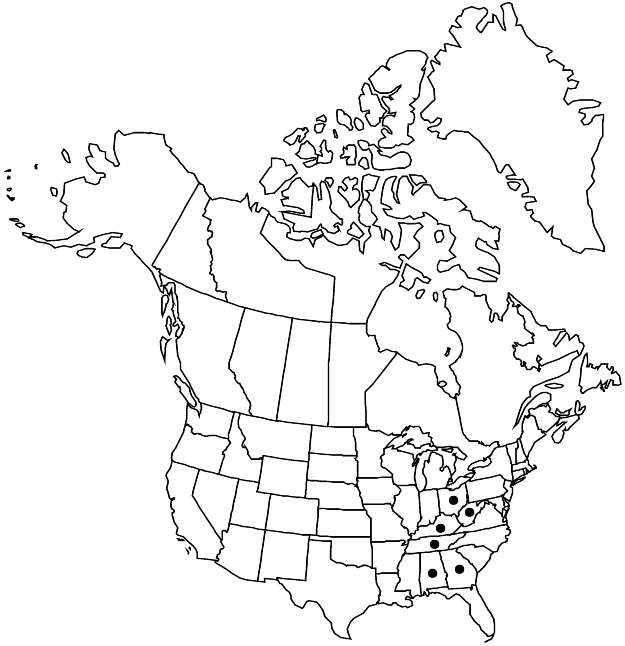Difference between revisions of "Silene rotundifolia"
Gen. N. Amer. Pl. 1: 288. 1818.
FNA>Volume Importer |
imported>Volume Importer |
||
| (2 intermediate revisions by one other user not shown) | |||
| Line 8: | Line 8: | ||
}} | }} | ||
|common_names=Round-leaved catchfly | |common_names=Round-leaved catchfly | ||
| + | |special_status={{Treatment/ID/Special_status | ||
| + | |code=E | ||
| + | |label=Endemic | ||
| + | }} | ||
|basionyms= | |basionyms= | ||
|synonyms={{Treatment/ID/Synonym | |synonyms={{Treatment/ID/Synonym | ||
|name=Melandrium rotundifolium | |name=Melandrium rotundifolium | ||
|authority=(Nuttall) Rohrbach | |authority=(Nuttall) Rohrbach | ||
| + | |rank=species | ||
}} | }} | ||
|hierarchy=Caryophyllaceae;Caryophyllaceae subfam. Caryophylloideae;Silene;Silene rotundifolia | |hierarchy=Caryophyllaceae;Caryophyllaceae subfam. Caryophylloideae;Silene;Silene rotundifolia | ||
| Line 36: | Line 41: | ||
-->{{#Taxon: | -->{{#Taxon: | ||
name=Silene rotundifolia | name=Silene rotundifolia | ||
| − | |||
|authority=Nuttall | |authority=Nuttall | ||
|rank=species | |rank=species | ||
| Line 50: | Line 54: | ||
|publication title=Gen. N. Amer. Pl. | |publication title=Gen. N. Amer. Pl. | ||
|publication year=1818 | |publication year=1818 | ||
| − | |special status= | + | |special status=Endemic |
| − | |source xml=https:// | + | |source xml=https://bitbucket.org/aafc-mbb/fna-data-curation/src/2e0870ddd59836b60bcf96646a41e87ea5a5943a/coarse_grained_fna_xml/V5/V5_411.xml |
|subfamily=Caryophyllaceae subfam. Caryophylloideae | |subfamily=Caryophyllaceae subfam. Caryophylloideae | ||
|genus=Silene | |genus=Silene | ||
Latest revision as of 22:11, 5 November 2020
Plants perennial; taproot stout, fleshy; caudex branched. Stems several, straggling to erect, freely branched, 2–7 cm, pilose and glandular, sparsely so proximally. Leaves: basal leaves withered at time of flowering, distal sessile, proximal petiolate, largest on mid to distal stem; blade subrotund to broadly ovate-lanceolate, 3–10 cm × 20–70 mm, base cuneate into petiole, apex short-acuminate, sparsely short-pilose. Inflorescences cymose, open, few-flowered, leafy, bracteate; bracts resembling distal leaves. Pedicels 1–3(–4) cm, viscid, with long septate-glandular hairs. Flowers: calyx indistinctly veined, tubular, broadened distally, constricted towards base around carpophore, ± umbilicate, 20–25 × 5–8 mm, herbaceous, glandular-pilose, lobes triangular, 3–4 mm, margins narrow, membranous, ciliate; corolla scarlet, clawed, claw equaling calyx, limb deeply 2-lobed, 10–15 mm, lobes lanceolate, sometimes with 2 smaller lateral teeth, ciliate, appendages saccate, 1–1.5 mm, with clear area abaxially; stamens shortly exserted; styles 3, shortly exserted. Capsules narrowly ellipsoid, not distending calyx, included within it, opening by 6 teeth; carpophore 6–8 mm. Seeds gray, broadly reniform, plump, ca. 1 mm, shallowly papillate. 2n = 48.
Phenology: Flowering late spring–summer.
Habitat: Woodlands, partially shaded cliffs and bluffs
Elevation: 200-600 m
Distribution

Ala., Ga., Ky., Ohio, Tenn., W.Va.
Discussion
Silene rotundifolia is clearly related to S. laciniata but is a well-marked species of the deciduous forest region.
Selected References
None.